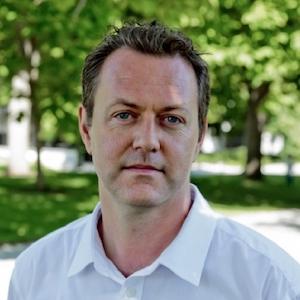Language Sciences member, Dr. Mark Turin, is an anthropologist, linguist and radio presenter. At the University of British Columbia, Mark currently serves as an Associate Professor of Anthropology. He previously served as Chair of the First Nations and Endangered Languages Program, as well as Acting Co-Director of the University’s new Institute for Critical Indigenous Studies.
What are your current research interests?
For over 25 years, my research interests have focused on the documentation, preservation and revitalization of Indigenous languages and cultural traditions. Starting in the 1990s, I have been fortunate to participate

in several collaborative partnerships in the Himalayan region, in Nepal and Northeast India in particular, with members of historically marginalized communities seeking to collect, protect and connect their endangered linguistic and cultural practices. Although my research partnerships have widened and deepened over the years, I am still motivated by the same questions: what do communities need to reclaim their languages, and what tools, technologies and processes can best support them in realising their goals?
What is a project you've worked on within the past few years that you're particularly proud of?
Since moving to UBC, through a partnership with the Heiltsuk Cultural Education Centre and the Bella Bella Community School, I am most animated about the work that we’ve done through the Heiltsuk Language and Culture Mobilization Partnership. Guided by Heiltsuk community members working or studying at UBC, living in Vancouver and of course most of all, by Heiltsuk in their traditional homeland in Bella Bella, we have found many creative ways to productively combine academic and community goals by expanding and deepening existing community language revitalization and cultural documentation in a digital environment.
What inspires you to pursue your line of research?
Oh, so many things! First and foremost, I am inspired by thirst and ambition of our incredible students in the Institute for Critical Indigenous Studies and the First Nations and Endangered Languages Program who seek to participate in and contribute to the powerful work of language reclamation. Second, I am profoundly motivated by the many Elders, language champions and activists in Indigenous communities whose commitment to speaking, sharing and transmitting their languages down the generations has triumphed over colonization, the Residential School system and centuries of racist legislation that sought to extinguish Indigenous voices. Finally, the urgency of this work drives me, as many Indigenous languages are in a precarious state with ever fewer fluent speakers.
If you had to choose a different career path, what would you be interested in pursuing?
Certainly something that involved a lot of interaction with people and where my natural curiosity was satisfied, so perhaps journalism or psychotherapy.
How do you like to spend your spare time?
Before the COVID pandemic, I think I would have answered this very differently. Now, I can say that I find rest and relaxation in growing vegetables in my front garden, in making music with my daughter, learning new recipes, doing a little daily yoga and meditation, and reading deeply and widely.
